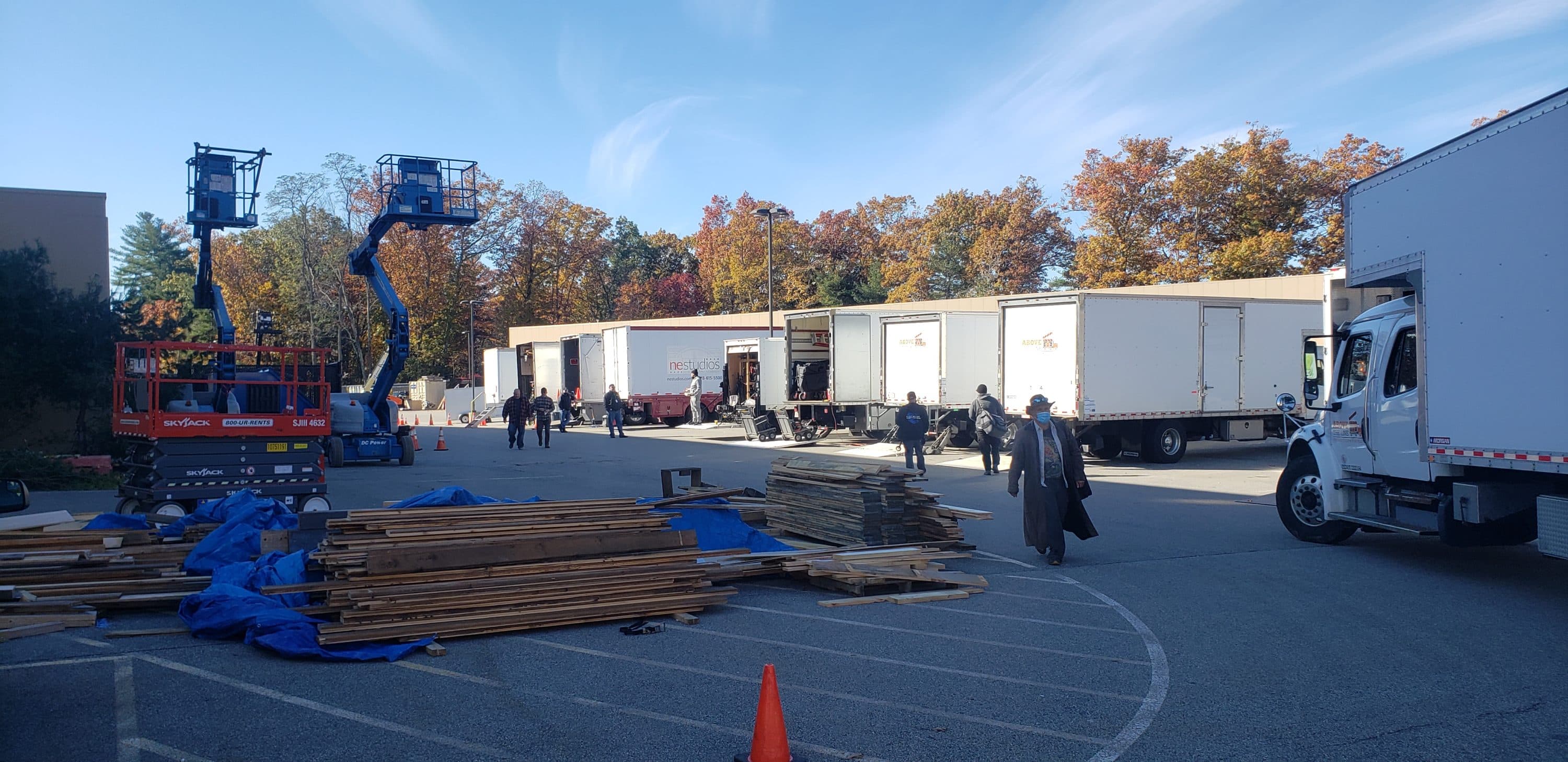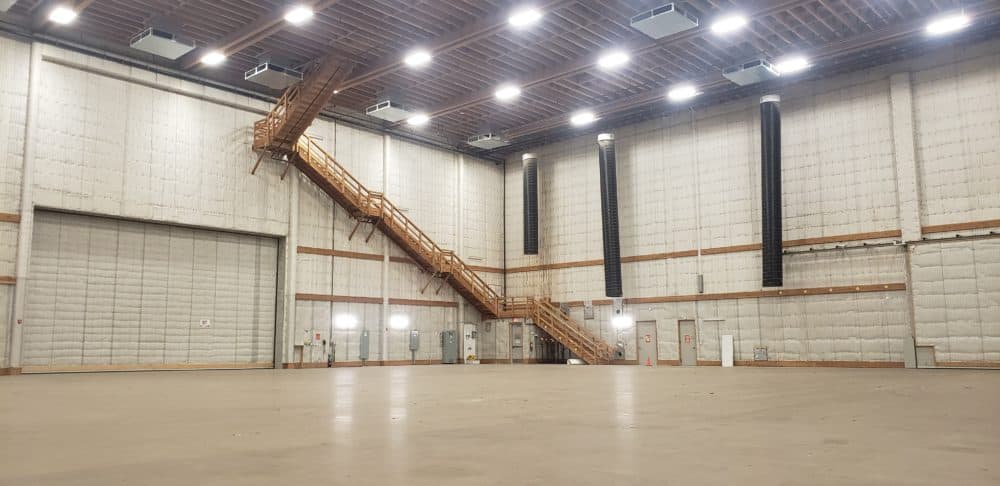Advertisement
Can Massachusetts become a destination for green film production?

Now that Massachusetts has a permanent film tax credit, leaders of the state’s film industry are considering ways to improve infrastructure. Some see this time as a chance to lower the field’s carbon emissions, grow the green economy and even position Massachusetts as a leader in green film production. With a wide range of enthusiasm levels, however, the consensus among those interviewed suggests that getting there would take a lot of doing.
Making Green Production a Priority
Gary Crossen manages the region’s largest production studio, New England Studios in Devens. From what he has observed to date, green production has taken a back seat to the debate over tax credits and recent concerns over worker health and safety. He says he fields questions about air filtration for the more than 70,000 square feet of sound stages, but not energy consumption, for example.
Yet, aside from a five-month COVID-19 hiatus, business remains robust at New England Studios. Streaming series “Dexter,” “Defending Jacob” and “Castle Rock” all filmed there and Crossen anticipates more to come. “We’re booked through end of year and talking to productions for the new year,” he says. With the tax credit sunset lifted, Crossen confirms an expansion is currently “under consideration.”
While Crossen wouldn’t specify details, he says if they do expand, “I don’t think there’s any question that some green technologies would come into play.” New England Studios will soon double its electric vehicle charging stations to 14 and its lighting and grip rental arm offers LED lights, which draw significantly less power than the tungsten lights they also rent. However, Crossen acknowledges that as a business that principally leases its space, production companies make the most impactful decisions.

Defining Terms and Setting Green Goals
In anticipation of COP26 (the 2021 United Nations Climate Change Conference), the Producers Guild of America (PGA) issued a call to action on Oct. 28 to the global entertainment industry to transition to clean energy. “Depending on the size, productions emit on average between 391 and 3,370 metric tons of CO2. Our industry’s emissions have been known to surpass those of aerospace, clothing, hotel and semiconductor industries,” according to the statement.
Because of so many variables from project to project — a feature film may shoot 60-90 days; a streaming series may shoot 10 times as many — it can be difficult if not impossible to estimate the industry’s carbon footprint let alone the impact within the boundaries of a state. (One of the sticking points of the Massachusetts tax credit debate has been the lack of timely and accurate data.) The PGA lists eliminating the use of diesel generators as its first of six recommendations and also calls for tracking metrics.
Members of the PGA have been paying attention to sustainability issues for more than a decade, forming a green committee in 2008 and co-authoring a dynamic online Green Production Guide in 2010. The Massachusetts Film Office posted the guide to its website several years ago. It elaborates on the tips mentioned above (such as reducing gas-powered transportation and generator use, reusing or donating costumes and props, and recycling whenever possible) and includes a green vendor database and carbon footprint calculator. But a recent search for green caterers or alternative fuel generators listed no Massachusetts vendors.
Advertisement
One Step Forward, Two Steps Back
All of this effort matters, says Gloucester actor and writer Steve Provizer, but he hasn’t seen much eco-friendly headway while working on major productions in Massachusetts. “It was something that began to bother me a long time ago,” he says. “Such obvious things as recycling bins were not present on sets. There was an accumulation of the sense that the industry was not paying nearly enough attention to this.”
“Such obvious things as recycling bins were not present on sets. There was an accumulation of the sense that the industry was not paying nearly enough attention to this.”
Steve Provizer
In July, Provizer published a commentary in The Arts Fuse that broadly illustrates the scope of production waste, identifies key institutional players, and details his own efforts to call attention to and help solve the problem in Massachusetts. Despite his best efforts, and to roughly paraphrase, he found evasions, shoulder shrugs and many dead ends. (My own research yielded similarly frustrating non-responses.) In our conversation and in writing, Provizer points to the industry’s fragmentation as a major roadblock. “Pockets of productions arise and are self-contained and interact with the world through unions and casting agencies,” he says. “There’s no continuity about it.”
Provizer cites the value of the Green Production Guide yet wonders what incentive production companies have to adhere to the recommendations and what penalties could come if they do not. He concludes that “to get something done on a meta level, you probably have to have some legislative connection to the process.” He explains that a rider or new bill tied to the tax credit could require a green supervisor on set. After all, entertainment companies quickly mobilized to train and hire on-set COVID-19 supervisors. “If you don’t have it, then no credit or a reduced credit,” he says.
Start Young, Start Now
Filmmaker and Emerson College staff member Homa Sarabi-Daunais also sees policy as a key factor in increasing green production. “We need to do grassroots organizing using the power of college students and push for regulations,” she says, reasoning that Massachusetts has Ed Markey, sponsor of the Green New Deal. She notes that Markey spoke at the Hollywood Climate Summit in September and wonders, “Do we have production in the Green New Deal?”
“I tell students if we want to keep making films for 15 or 20 years, we can only do it if it’s a sustainable practice.”
Homa Sarabi-Daunais
Like Provizer, Sarabi-Daunais observed avoidable excess and lack of basics, like recycling bins, while working on the set of a major production in Massachusetts. She says that one area of waste comes from “satisfying the stars; each of them have their own vehicles or trailers that are always running.”
This mindset, says Sarabi-Daunais who grew up in Iran, is indicative of “a strictly American way of making films. [In other parts of the world] people come to sets on their bikes and no one is running to get anyone coffee.” She wants young filmmakers to think differently about their approach so they do not automatically reproduce the Hollywood model. “I tell students if we want to keep making films for 15 or 20 years, we can only do it if it’s a sustainable practice.”
Sarabi-Daunais pushed for Emerson to become a founding member of the Green Film School Alliance and now serves as the college’s liaison. Earlier this year, the department of visual and media arts started issuing a "green seal" to projects that meet sustainable criteria. (I’m on the faculty at Emerson but am not involved in this project.) Certification comes with a $100 reimbursement. Sarabi-Daunais says she sees the program — and similar forms of encouragement — as one stop along a continuum of arts sustainability that encompasses anti-racism, wage fairness and the #MeToo movement. “These are all connected. The whole culture is changing and this is the time to change,” she says.

Growing What’s Already Green
Westerman Props Warehouse in Worcester has an inherently green business model and its business is booming. “We have 50,000-60,000 square feet of everything that would’ve gone to landfill,” says manager Dan Diaz about the walls lined with vintage furniture, old telephones and bric-a-brac. Diaz started the unexpected offshoot of the restaurant supply company in 2008 after outfitting “Shutter Island” sets with kitchen equipment.
“The TV commercial world is blowing up in New England,” says Diaz. Commercials add short-term agreements to his already abundant work helping set dressers find items like era-appropriate office chairs for feature films or streaming series.
Diaz likewise works with productions once they’ve wrapped and want to find homes for myriad leftover but still useful stuff. Because he signs non-disclosure agreements he cannot give specifics, but mentions helping several major productions donate food, furniture and building materials to an array of Central Massachusetts charities. In doing that, he’s had contact with “producers of sustainability,” or crew members hired to help a production go green.
Can More Film Work Mean More ‘Green’ Work?
If Diaz and others interviewed agree on one thing it’s that film production in Massachusetts looks promising, jobs wise. He says he never imagined he’d work in film and now he’s hiring others who feel the same way. “I’m working with a local vocational school to get inner city kids trained into this industry,” adds Diaz. “You’re seeing more and more diversity [among the workforce] and I’m working to make that even better.”
When New England Studios’ Crossen looks to the future, he also sees jobs, and ones that cover the entirety of Massachusetts, not just the Boston area. “The financial benefits have been spread evenly across the state,” he remarks about the industry’s growth.
The New York-based Earth Angel trains “Eco PAs” (production assistants) to help sets go green, including in Massachusetts. Provizer wonders about retooling existing Massachusetts businesses or nonprofits to do similar job training.
One concept tied to the Green New Deal — the creation of a Civilian Climate Corps (also something Ed Markey backs) — could fill this gap. Then, instead of racing around set with single-use plastic water bottles, tossed after one sip, PAs could race around filling washable, reusable bottles, and so forth.
These are the kinds of ideas that keep Sarabi-Daunais up at night. “The political will and power exist in Massachusetts. We just have to push for it,” she says.
